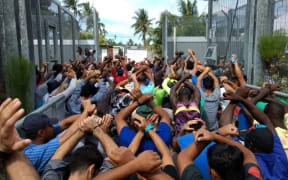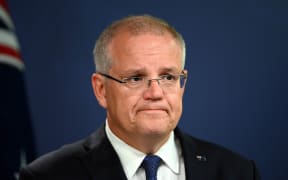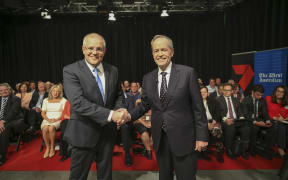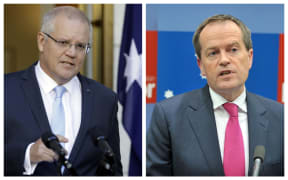By Tim McDonald
Opinion - Australia's Prime Minister Scott Morrison made a last-minute dash to north Queensland yesterday to back local candidates in key electorates.
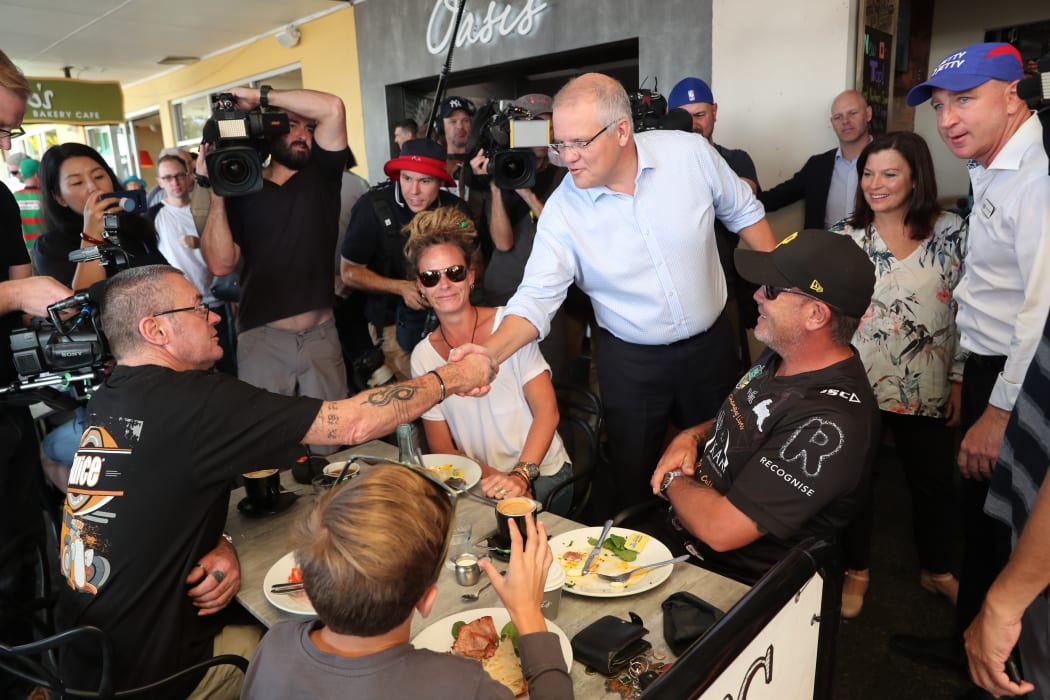
Scott Morrison greets supporters at an election rally in Brisbane. Photo: AFP PHOTO / AUSTRALIAN PRIME MINISTER'S OFFICE / ADAM TAYLOR
The outcome in Queensland could be decided in a handful of marginal seats, where voter dissatisfaction and a crop of minor parties - some with extreme views - could disrupt the established order.
Between frames at a crowded bowling alley at Ayr in north Queensland, Peter Whelan says he's "sick" of the two major parties.
"One, they're just feathering their own nests. And two, they've been backstabbing each other," he says of the current government, adding that Labor are "going to rip us off like you wouldn't believe".
He picks up a ball and bowls a lousy frame, then declares that talking about politics put him off his game.
It's a neat summation of the electoral landscape in north Queensland, where voters are frustrated and the election seems an unwelcome intrusion into the real business of making a living.
A very tight race
Yet Queensland is hotly contested electoral turf. Of the 30 seats in this state, 12 are held by a small and very losable majority - eight of them are on margins of less than 2 percent.
North Queensland is so important that Mr Morrison swung through its major centres, Townsville and Cairns, on the last day of the campaign.
When asked why he had chosen it for an election-eve blitz, Mr Morrison said: "It says that I take nothing for granted anywhere in the country."
It was hardly his first visit to the region: Townsville was also the final stop in a much-publicised week-long bus tour by Mr Morrison last year. Dubbed the "ScoMo Express", the tour drew ridicule and many saw it as simply a populist stunt - especially when it emerged that Mr Morrison had travelled part-way by plane.
But it did reinforce the importance of a state that was perceived as key to the government's decision to dump Malcolm Turnbull, a moderate, from office last year - triggering a complex series of events that ultimately installed Mr Morrison.
Opposition leader Bill Shorten, too, visited Townsville earlier in the campaign and went jogging with retired rugby league star Johnathan Thurston.
Enter the colourful politicians
So the weird, wild and disaffected politics of Queensland could tip the balance in Saturday's election.
In Dawson, where Peter Whelan votes, the margin is 3.4 percent. The sitting government MP George Christensen has been the subject of negative headlines over the amount of time he has spent overseas in Manila with his Filipina fiancée.
Nearby is the seat Herbert, which Labor claimed by just 37 votes in 2016. Further south, Capricornia and Flynn are both held narrowly by the government. In Brisbane, Labor has its eyes on five marginal government seats - including Dickson, held by Home Affairs Minister Peter Dutton.
"Labor has not always polled well in Queensland, so if the government's going to change, they need to do well here," said Prof Anne Tiernan, a politics expert at Griffith University.
A recent study by polling group Ipsos found that fewer than 41 percent of Australians are satisfied with the way democracy works in the country, down from 86 percent in 2007. The intervening years have seen a rotating cast of prime ministers, often torn down internally, and a dual citizenship crisis which made 15 sitting MPs suddenly ineligible for office.
As confidence in the two major parties has eroded, minor parties and independents have smelled opportunity. Pauline Hanson, a longstanding critic of immigration and multiculturalism, is running for the Senate and her One Nation party is running candidates for the lower house across the state.
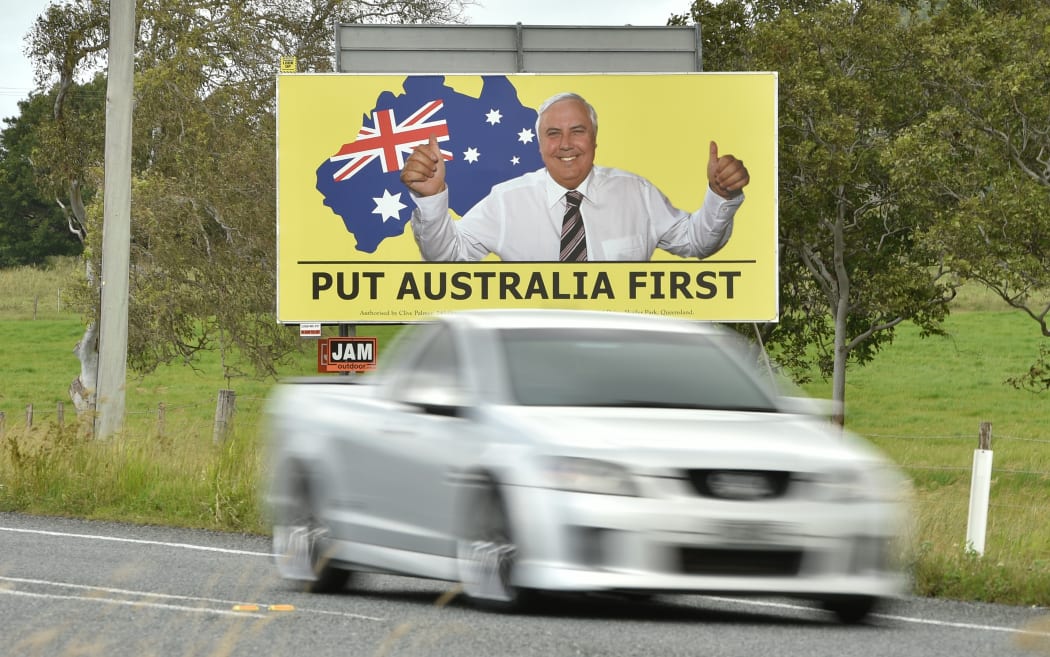
Clive Palmer doesn't shy away from mimicking Donald Trump. Photo: AFP
She's flanked further to the right by Senator Fraser Anning's National Conservative Party. Mr Anning has called for a return to a "European Christian" Australia and even blamed the Christchurch massacre on New Zealand's immigration programme.
Added to the mix is Clive Palmer, a businessman who rather self-consciously mimics Donald Trump with the slogan "Make Australia Great". He's spending millions of dollars on advertising, with gaudy yellow billboards hovering over highways across Queensland.
The colourful Bob Katter is running a number of candidates though the Katter's Australia Party, promising to put "Australia's interests first".
A city-rural divide
In Australia's typically left-leaning inner cities, voters tend to look at the right in smaller towns with bewilderment.
In an urban park in inner Brisbane, Henry Ladd - out walking his dogs - sees it as "a real race to the bottom in some of these electorates".
"It's on a spectrum of climate change denialism to full-on racism on the right. It's kind of scary."
But there are certainly many people who hold anti-immigration views in Queensland, like Robyn Warhurst, who lives 1330km up the coast in Townsville and expects to vote One Nation.
"The most important thing I think is to stop immigration, and start looking after our own people. You know - pensioners, schools, hospitals. Put the money to that first."
Environmentally-minded city-dwellers are also troubled by the view that mining - for decades a key industry for the state - is the best solution for unemployment.
"Rather than training people to go to a mining course, why don't you train them for solar electric? Why don't we shift to renewables in Queensland? We've got an abundance of sun," said Mr Ladd.
But in places like Townsville many people think the city folks don't get it.
Unemployment there is around 8 percent (compared with about 5 percent nationally), and many locals say the problem is too urgent to pass up a mining project while they wait for another industry to create jobs.
Jobs Vs the environment?
Steve Malcolm, a building consultant, scoffs at suggestions that there's any alternative to mining to boost the local economy.
"They say, 'we're going to produce jobs with tourism.' Well the fact is, that just doesn't happen."
He has a sign hanging over his fence supporting Adani, an Indian company that's establishing one of Australia's largest thermal coal mines in Queensland. It's a $A2bn project. Adani's economics expert told the Queensland Land Court the mine would generate 1464 jobs in Australia, with most of them in Queensland.
Critics worry about its contribution to global warming, as well as possible local environmental impacts. They're also concerned that a green light for Adani could mean a number of neighbouring mining projects also get approval.
The support for Adani is strongest closest to the mine site, but it's unpopular elsewhere. So all parties face a choice about who they please and who they upset on this key question. A pro-coal agenda might win votes in the north at the expense of votes in Brisbane and vice-versa.
The government has positioned itself as pro-coal, which it hopes will shore up its vote in north Queensland. Labor, being conscious of the city vote, has been more circumspect, insisting it will honour existing approvals. Still, various Labor candidates have expressed different views.
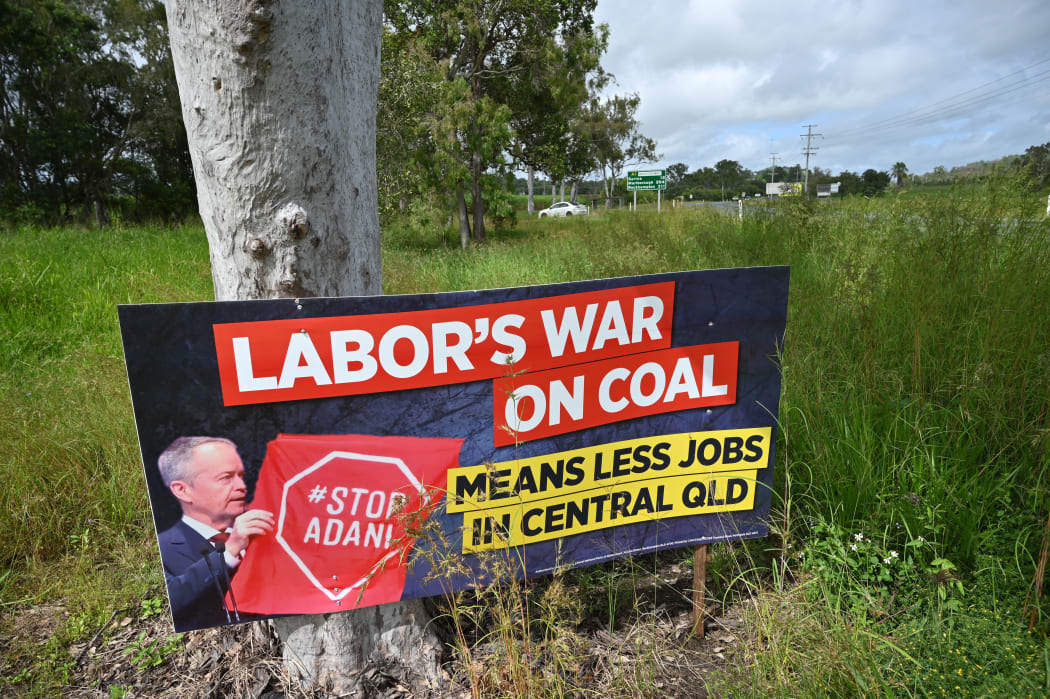
An anti-Labor party election sign in Bowen in northern Queensland. Photo: AFP
The right-leaning minor parties, who favour the project, inject additional complexity into the major parties' well-laid strategies.
Many voters in north Queensland seem in a foul mood with the entire political class, resulting in protest votes, or "donkey votes" - a term that means simply voting for candidates in the order they appear on the ballot paper.
"I think I speak for a few people when I say a lot of people are disenchanted with what's going on in Australian politics," Townsville resident Aaron Green said.
Mr Morrison will be hoping that his last-minute sandbagging will be enough to hold up his support, and potentially, the fate of his government.
- BBC
